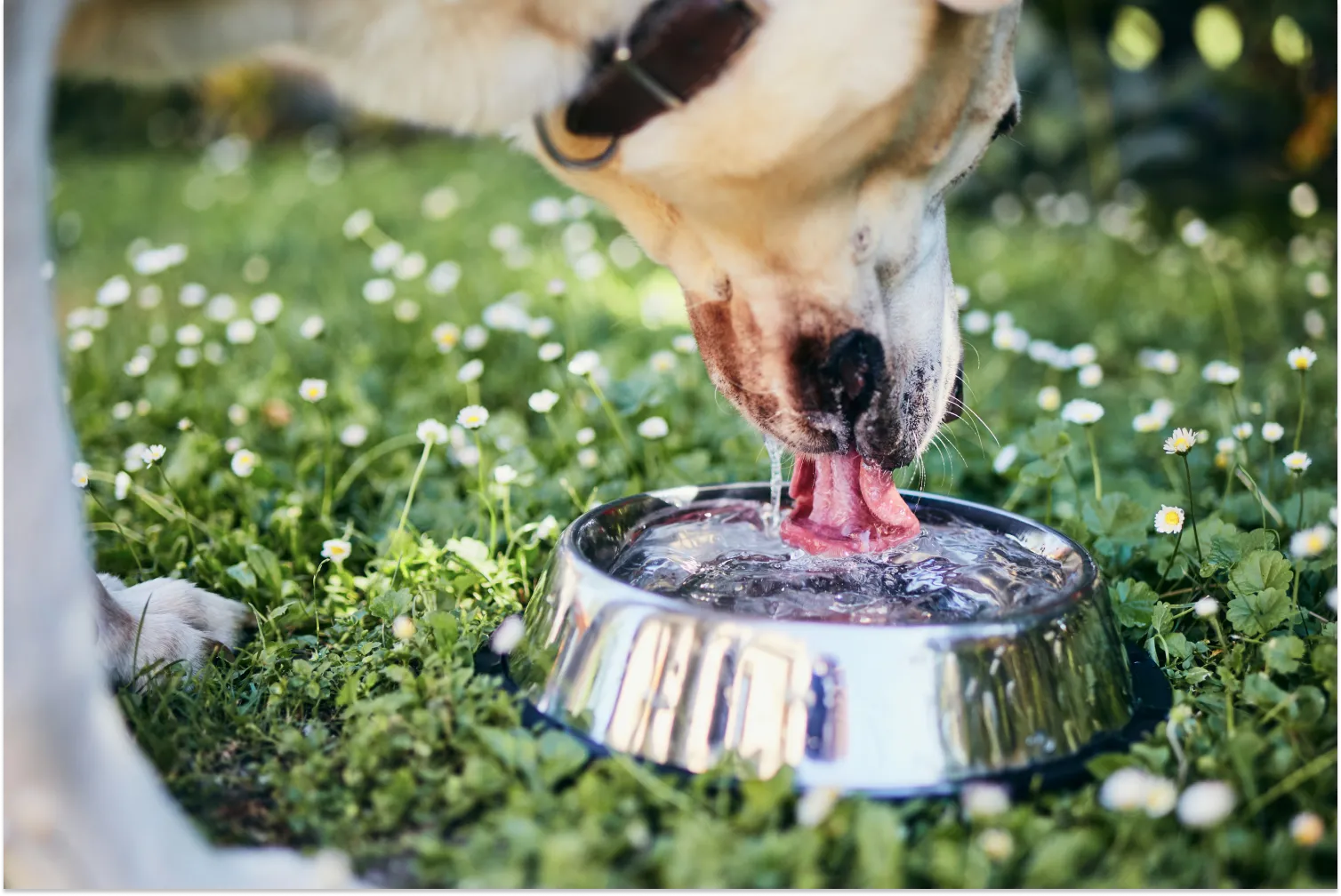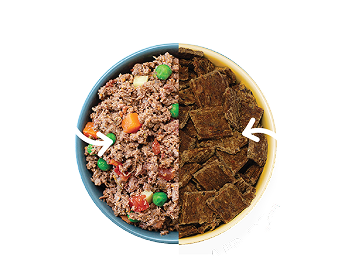
How To Tell if a Dog Is Dehydrated and What To Do
Maintaining your pet's health requires a keen eye and understanding of their needs. One aspect of canine health that often goes unnoticed until it becomes a critical issue is hydration.
Proper hydration is not merely about quenching your dog's thirst; it's an essential component that influences your dog's overall health, affecting vital functions like digestion, nutrient absorption, and temperature regulation.
Let’s delve into the importance of hydration, safe water sources, and the dangers of unsuitable ones. We also want to equip you with the knowledge to recognize dehydration symptoms, offer immediate solutions, and identify when professional veterinary care is necessary.
Prevention strategies will also be covered to help you proactively guard against dehydration in your furry friend.
How Dangerous Is Dog Dehydration?
Water is as vital to our pets as it is to us. It supports digestion, circulation, and waste removal while ensuring that bodily functions run smoothly. Just as we need to hydrate regularly, dogs also need a steady water intake to remain healthy and active.
As a rule of thumb, dogs should consume about one ounce of water per pound of body weight each day. However, this can vary based on various factors like age, health status, diet, and the weather.
For instance, puppies and older dogs may require more water, as do active dogs or those who live in warmer climates. Similarly, dogs that primarily eat dry food may need more water compared to those on a wet or raw food diet.
Not all sources of water are safe for your beloved pet. While it's true that dogs have robust immune systems that can handle a certain level of bacteria and pathogens, some water sources can still pose a risk.
This is why it's crucial to ensure your dog drinks clean, fresh water and avoids potentially hazardous sources. In the following section, we will go into detail about identifying safe and unsafe water sources for dogs.
Keeping your dog well-hydrated is not just about providing enough water. It's also about ensuring the water comes from a safe and healthy source. Understanding the importance of hydration and how much water your dog needs can significantly contribute to your dog's overall well-being.
What Are the Potential Risks of Various Water Sources?
Water is the essence of life, but not all water sources are created equal, especially when it comes to your dog's health. Being naturally curious and not particularly discerning about where they get their hydration from, dogs might drink from any water source available. This is where your responsibility as a pet owner is to steer them clear of potentially harmful sources.
One might think that natural sources like puddles or ponds are safe since they're part of the natural environment. However, these can often be breeding grounds for harmful bacteria, parasites, and algae.
Stagnant water, especially, can host harmful organisms like leptospirosis and giardia, which can cause severe diseases in dogs. Furthermore, some algae found in ponds and lakes produce toxins that can be deadly to your pet.
Even tap water can pose a risk in certain areas if it's heavily chlorinated or contains high levels of harmful minerals. Always provide your dog with clean, fresh water from a trusted source. A simple filtration system for your home tap water can make a huge difference in ensuring your dog's water is safe and healthy.
What Are the Signs of Dehydration in Dogs?
As a dog owner, one of your primary responsibilities is to ensure the well-being of your pet. Dehydration in dogs is a serious concern that can lead to severe health complications if not addressed promptly.
Knowing the signs and symptoms of dehydration can help you take immediate action and potentially save your pet's life.
Signs and Symptoms of Dehydration in Dogs
- Loss of Appetite: Dehydrated dogs may not feel well and might show less interest in food.
- Lethargy: Lack of energy or enthusiasm can be an early sign of dehydration. If your dog is usually playful but seems listless, dehydration could be a reason.
- Dry Nose and Gums: A healthy dog's nose is usually moist, and its gums are slick. If your dog's nose is dry and their gums are sticky, it could be a symptom of dehydration.
- Sunken Eyes: Dogs experiencing dehydration might have sunken, dull eyes instead of their normal bright and alert eyes.
- Loss of Skin Elasticity: A quick test for dehydration is to gently pinch your dog's skin between your fingers and then release. The skin should quickly spring back into place. If returning to its natural position takes longer, your dog could be dehydrated.
- Increased Heart Rate: Dehydration can also cause an increased heart rate in dogs.
- Panting or Rapid Breathing: If your dog is panting excessively or breathing rapidly, even in a cool environment, it might be a sign of dehydration.
- Decreased Urination: If your dog is dehydrated, they might urinate less frequently than usual, and the urine could be darker in color.
Recognizing the signs of dehydration in your dog is crucial for their health and well-being. Dehydration can occur quickly, especially in hot weather or after vigorous exercise, and it's important to catch it early before it becomes a severe health concern.
Common physical signs of dehydration in dogs include sunken eyes, dry and sticky gums, excessive panting, and loss of skin elasticity. Skin elasticity is checked by gently lifting the skin at the back of your dog's neck or between the shoulder blades. In a well-hydrated dog, the skin should spring back immediately, but if your dog is dehydrated, the skin will return to place slowly.
Behavioral changes can also be a good indicator of dehydration. These can range from lethargy and decreased appetite to unusual aggressiveness. Your dog might also exhibit signs of discomfort like pacing, changes in sleep patterns, or a decrease in their typical activity level.
However, these signs can also indicate other health issues, and it's important to consult a veterinarian if your dog shows persistent symptoms. Remember, dehydration is an emergency requiring immediate attention, and understanding these signs is the first step in helping your dog when needed. In the next section, we will discuss the steps you can take if you suspect your dog is dehydrated.
Immediate Steps To Take if Your Dog Is Dehydrated
Dehydration in dogs is a pressing issue that needs to be addressed promptly to prevent further health complications. The moment you notice signs of dehydration in your pet, it is crucial to take action.
Here's a more detailed guide on what an owner can do if they suspect their dog is dehydrated.
- Encourage Fluid Intake: The first thing to do is encourage your dog to drink water. Provide them with fresh, clean water, and place it near them. Remember, forcing your dog to drink may cause stress or choking, so encourage them to sip gradually. Some dogs may prefer drinking from a running tap, a pet fountain, or even a water bottle.
- Use Pet-Safe Rehydration Solutions: If your dog is reluctant to drink plain water, consider rehydration solutions specifically designed for pets. These solutions contain electrolytes and sugars to aid in rehydration and energy replenishment. They can be mixed with water or offered as they are. Always follow the instructions on the package to ensure you're giving the correct amount to your pet.
- DIY Rehydration Solution: In a pinch, a homemade rehydration solution can be helpful. Dissolve a teaspoon of salt and a tablespoon of sugar in a liter of warm water. Once it's cooled, offer it to your dog in small amounts at regular intervals. The sugar and salt combination can help replenish lost electrolytes and trigger the thirst response.
- Moist Food: Offering wet food can also contribute to hydration. Wet or canned dog foods contain significant moisture and can be a good option for dogs reluctant to drink water. A Pup Above fresh food contains bone broth for hydration. Remember to transition gradually if your dog is not used to wet food to avoid digestive upsets.
- Oral Hydration Via Syringe: If your dog is severely dehydrated and not voluntarily drinking, you can use a syringe to administer water or rehydration solution orally. Fill a small, needle-less syringe with the liquid, gently insert it into the side of your dog's mouth, and slowly push the plunger, allowing your dog time to swallow. Be careful to avoid shooting the liquid directly down their throat to prevent aspiration.
- Cool Environment: Keep your dog in a cool, quiet place away from direct sunlight. Excessive heat can exacerbate dehydration.
- Monitor Urination: Keep an eye on your dog's urination. If they are not urinating or if the urine is dark in color, it's a sign of severe dehydration, and you should seek veterinary care immediately.
These steps are meant to be initial responses to dehydration. Persistent symptoms, worsening conditions, or severe signs of dehydration warrant immediate veterinary attention.
When Should I Seek Veterinary Care?
Severe signs of dehydration like excessive panting, rapid heart rate, dry and pale gums, and collapse require immediate veterinary intervention. Similarly, if your dog is lethargic, refuses to drink or eat, or has persistent vomiting or diarrhea, it's a clear signal they need professional help.
Dehydration can lead to serious complications if left untreated. It can negatively impact your dog's kidney function, cause electrolyte imbalances, and lead to shock — all of which can be life-threatening.
Your dog will undergo a thorough examination at the vet clinic, including blood tests and possibly urinalysis. This helps the vet determine the severity of the dehydration and check for any underlying conditions causing it. Treatment usually involves fluid therapy, where fluids are administered intravenously or under the skin (subcutaneously) to quickly restore your pet's hydration status.
Your dog's health and well-being should always be the top priority, and it's better to err on the side of caution. It's best to consult your vet immediately if you're ever in doubt. They can provide guidance and necessary treatment to ensure your dog recovers swiftly and safely.
Know Your Pup
To understand and notice the early signs of dehydration, you’ll need to understand what is normal for your pup. Every pup is different.
Hydration is essential to your pet's overall health, playing a pivotal role in numerous physiological processes. Dehydration, in contrast, can lead to serious health complications if not promptly addressed.
Understanding the signs of dehydration, such as lethargy, dry nose and gums, panting, decreased appetite, sunken eyes, and decreased skin elasticity, enables pet owners to quickly recognize potential problems and take necessary action.
The responsibility of keeping our pets hydrated falls squarely on our shoulders. Ensuring regular access to clean, fresh water, providing shaded areas during hot weather, limiting strenuous exercise during the warmest parts of the day, and paying close attention to our pets' behaviors are crucial to preventing dehydration.
For better dietary needs, including fresh, dry, and wet foods, check out A Pup Above.
Sources:
How Much Water Should a Dog Drink? | Advanced Care Veterinary Hospital
3 Ways Playing in Puddles Could be Deadly to Your Dog | Pet Health Network
Can Dehydration Affect Your Eyes? An Expert Weighs In | Health Line
Signs of Dehydration in Dogs & What You Should Do | Plains Veterinary Oncology
Top Stories

Why Do Dogs Lick Their Paws?

Why Do Dogs Whimper & Make Noises in Their Sleep?

Healthy Vet-Approved Homemade Dog Food Recipes

How To Cook Sweet Potatoes for Dogs






















